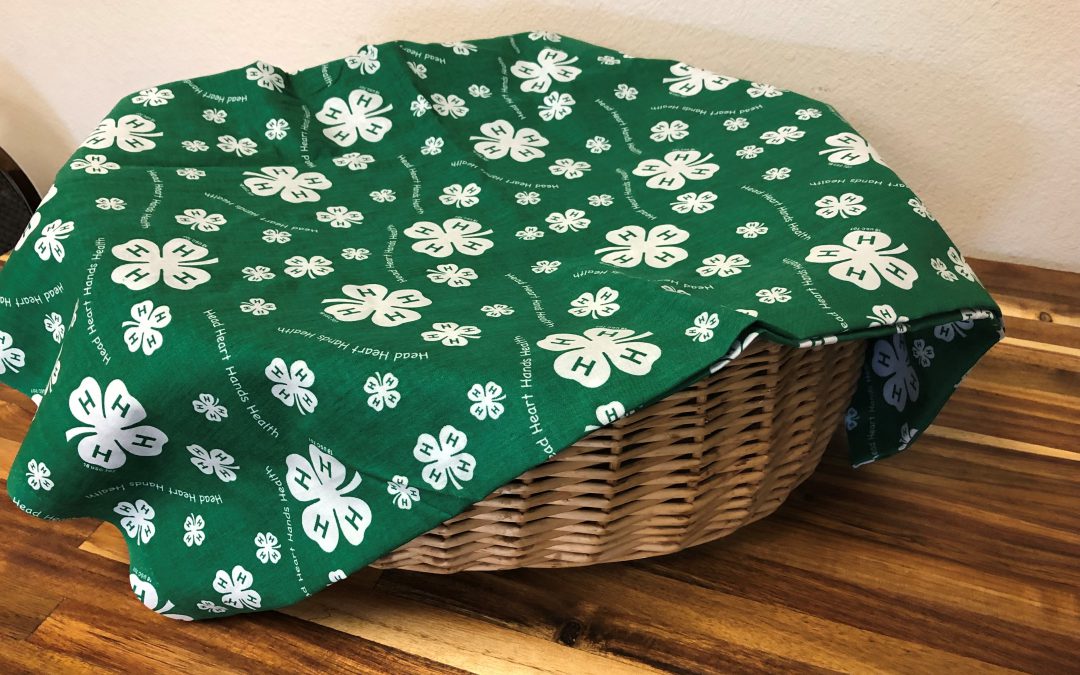
by Marie Arick | Mar 11, 2019
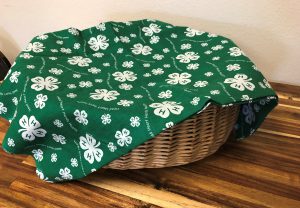
4-H Food Challenge Mystery Basket
Being creative in the kitchen…using a surprise set of ingredients…making a tasty dish…frequent watcher of The Food Network? Then the 4-H Food Challenge camp is the summer day camp for you!
Take a Sneak Peek
Here’s a sample list of possible ingredients in the Fruit & Vegetable category:
- 4 medium potatoes
- 1 cup carrots, sliced
- 1 cup of celery, sliced
- 1 ½ cups green bell pepper strips
- 1/3 cup onions, sliced
- 1 clove garlic, minced
- 1 tomato, cut into wedges
- 3 tablespoons of canola oil, divided
- ½ cup of water
- 2 tablespoons of low sodium soy sauce
- 1 ½ teaspoons of cornstarch
Any idea what you’d prepare? What would you name your dish?
Participants in the 4-H Food Challenge camp will work in teams with 3 to 4 members. Teams will be presented with:
- a food category
- a set of mystery ingredients
- 40 minutes to create a dish, prepare a presentation about their dish, and clean their work area
When time is up, teams will present their creation to a panel of judges describing their collaboration in creating the dish, food safety practices used by the team, how they worked together, and finally, a description of the dish including some nutrition information.
We all eat, so food safety and preparation are skills that we all need. 4-H Food Challenge campers will learn those skills along with nutrition knowledge, teamwork and presentation skills. Look for this day camp opportunity in your local UF/IFAS Extension 4-H program this summer, and join us in putting our skills to the test!
*The 4-H Food Challenge is loosely based on The Food Network show “Chopped” and adapted from the Texas 4-H Food Challenge Contest.
by Jena Gilmore | Jan 18, 2019
While this year’s hunting season is winding up, it’s never too early to think about getting ready for next year. Whether it’s deer, squirrel, ducks, dove or turkey, there are important hunting rules and guidelines both youth and adults must follow. Organizations like the Florida Fish and Wildlife Conservation Commission (FWC) and your local UF/IFAS Extension Office provide programs to keep you on target each hunting season!
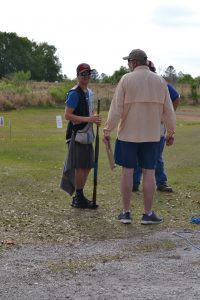
Safety is a key element of any shooting sport.
SAFETY FIRST
Each hunter must take some version of the Hunters Safety Education course. Anyone born on or after June 1, 1975, and 16 years or older, must pass a hunter safety course before a hunting license can be purchased. There are four options to complete this requirement:
- Traditional Course and Skills Day
– Face-to-face instructor led course
– Hands-on skill day – register here
- Online Course and Skills Day (two part process)
– Complete one of the online courses
– Hands on skill day – register here
- Florida Virtual School Outdoor Education
– FREE to Florida students in grades 9-12 or ages 12-18
– Apply here
– Earn 0.5 credit for high school
- Firearms Safety Certification and Online Course
– Adults only
– Must have completed previous firearms training
– Must complete one of the online classes in Option 2
– Follow procedures outlined in the Application for Hunter Safety Certification
If you’re using the Hunter Safety Mentoring Exemption and hunting under the supervision of a qualified hunter, you are exempt from this requirement.
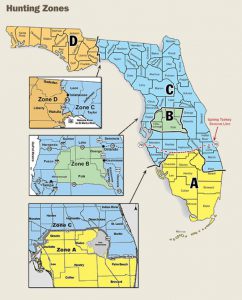
Our district covers Zone D – Escambia to Gadsden/Wakulla & Zone C – Leon & Jefferson. Map courtesy of FWC.
Find Your Zone
Hunters should strive to be good stewards of Florida’s resources to keep this sport a tradition for generations to come. Take the time to determine what hunting zone you live in. Your zone determines your hunting season – meaning the appropriate time you can collect specific game in that area. You can find the Florida Hunting Zones Map here: http://myfwc.com/hunting/season-dates/zone-map/. Next, check the annually updated hunting season dates and bag limits related to your zone to stay in compliance with FWC regulations: http://myfwc.com/hunting/season-dates.
4-H Shooting Sports
Find your local UF/IFAS Extension Office and determine if there is a 4-H Shooting Sports program in your county. Participation in a 4-H Shooting Sport program provides year-round opportunities for youth to not only practice their discipline but also to explore other disciplines in a safe, inclusive, environment with 4-H volunteers/mentors!
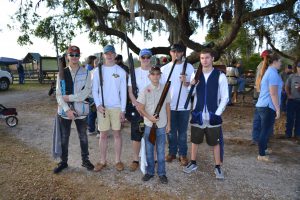
4-H grows important life skills like responsibility, goal setting and teamwork in youth through shooting sports.
4-H Shooting Sports includes air rifle, small bore rifle, archery, shotgun, muzzleloading and hunting and develops important life skills in a safe and educational environment. Shooting sports day camps are popular during the summer, so ask you 4-H Agent if one will be scheduled for you county.
Attention Volunteers!
Would you like to become become 4-H Level 1 Certified to coach and teach youth shooting sports? If you are already enrolled as a 4-H volunteer, log in to your profile and register for the February 16th hands-on training in shotgun and archery. You’ll also complete five online learning modules as part of your training. If you’re new to 4-H, enroll at florida.4honline.com, and let your county 4-H Agent know that you are interested in teaching shooting sports.
Explore the links below to see how you and your youth can get involved in 4-H and stay up to date on the hunting regulations for your area:
by Heather Kent | Sep 21, 2017

This article will help you know what to expect at your first club meeting.
Is your family new to 4-H? Welcome! We are glad you chose us to help your child reach his/her fullest potential. Here are a few basics to help you become familiar with 4-H as you begin your journey with us:
- The 4-H year starts September 1st through August 31st. Whatever your child’s age is on September 1st is his/her “4-H Age” and determines his/her eligibility for certain programs.
- There are four age divisions in 4-H (you can find policies for participation based on age here):
- Cloverbuds (ages 5-7)
- Juniors (ages 8-10)
- Intermediates (ages 11-13)
- Seniors (ages 14-18)
- Youth can participate in 4-H through a variety of methods (camps, school programs, after school programs, and clubs). Youth can participate in all or just one of these delivery modes, or types of 4-H memberships.
- To join a club, you will want to enroll through 4HOnline. Many counties offer an Open House, or Kickoff night where families can preview the different types of clubs available in their community. Some clubs offer a variety of projects, while other clubs focus on a particular project (like archery or sewing) or a project area (like animal science or leadership). Some clubs meet all year and others may only meet for six consecutive weeks (SPIN clubs- special interest clubs). If you are not sure which club is the best fit for your family, schedule an appointment with your local UF IFAS 4-H Extension Agent.

Talk to your local 4-H Agent to decide which club best suits your family.
Preparing for your first club meeting:
- There is no uniform for 4-H, but some clubs will order shirts for youth to wear when they go on field trips or compete in contests.
- Clubs typically open with icebreakers, or get to know you games (especially at the beginning of the 4-H year).
- The club business meeting lasts about 1/4 of the total club meeting and is always opened with the American Pledge and the 4-H Pledge. Check out this video to learn the 4-H Pledge. During the business meeting, youth will give committee reports, discuss and vote on club business, and announce other 4-H opportunities. Clubs made up of primarily Cloverbud members do not have elected officers, but encourage members to take turn leading the pledges and helping with the business meetings.
- The first club meeting is the organizational meeting. During this meeting, youth will plan the club calendar and elect officers. If it is a new club, they will also select a name for the club.
- Once the club calendar is set, about half of the club meeting time will be spent on educational activities. This may include a guest speaker, field trip, or a hands-on activity to learn about a subject or project area.
- Every club participates in at least one service project each year, decided on by the club members.
- The last 1/4 of the meeting is usually spent on recreation- this can be icebreakers or team building activities. Sometimes, it is just a time to socialize while enjoying light refreshments.
What is the role of the parent? 4-H is a family affair, offering many opportunities where both child and parent participate in common interests. This not only strengthens the club, but strengthens family ties. When parental support is positive, the club is likely to become stronger, larger, and more active because parent volunteers help broaden the scope and reach of the club. A few ways parents can support and strengthen the club include:
- Arriving on time and being prepared (if working project books, make sure your child has theirs)
- Offering to help with a club meeting or activity
- Sign up to help with refreshments
- Offer to share a skill or knowledge that you have by becoming a 4-H project leader
We are glad to have you as a part of our 4-H Family and look forward to getting to know yours!
by Melanie Taylor | Apr 24, 2017
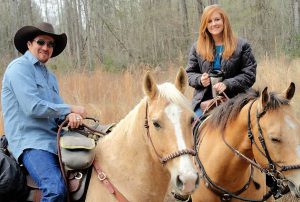
Russell and Julie McMillian, Gulf County 4-H Alumnae and 4-H Leaders
Russell and Julie McMillian both grew up in Gulf County and together have established a thriving business based on their love of horses. They now own a small farm in Dalkeith, just south of Wewahitchka, and their business Rockin’ M Ranch, consists of horseback riding lessons for beginners and beach rides for tourists and locals alike along the beautiful beaches of Cape San Blas.
How did this all begin? Russell and Julie both grew up as Gulf County 4-H members of the Big River Riders 4-H Club. They both participated in a variety of 4-H programs; including Horse Camp, Camp Timpoochee, Congress (now known as 4-H University), District Events, North Florida Fair Ag Judging, Area A and State 4-H Horse Shows, etc. They both learned the values of 4-H through learning how to raise and compete with their animals, agricultural commodities, leadership skills, public speaking, community service, good decision making skills, and much more…
As adults, they both went in separate directions, but still maintained their love of horses and the farm life. Russell began his career in flooring and tile work, while Julie received her education degree and taught Kindergarten at Wewahitchka Elementary School. After reconnecting as adults, they married on September 25, 2010 and turned their passion for horses into a full-time love by creating their own business, Rockin’ M Ranch. Russell still does flooring, tile work on the side, and helps his grandparents with their hay business. Julie decided to leave the teaching field, and she manages their business full time. She began giving beach rides on the Cape at the age of 14 and still loves it as much today.
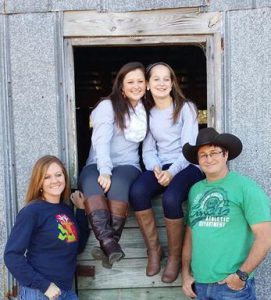
Julie and Russell McMillian pictured with Brooke (left) and Hayleigh (right).
Russell began his time with 4-H at the age of 12 and Julie was 8 years old. As members of the Big River Riders 4-H Club, they adored their 4-H leaders, Mr. Jesse Eubanks and Ms. Jean McMillian (Russell’s grandmother), and the Gulf County Extension Director, Roy L. Carter (now retired), whose passion for horses was contagious. Julie explained that she was a very shy child and that participating in public speaking for District Events really helped her come out of her shell. They both loved learning the values of the four H’s: Head, Heart, Hands, and Health. They feel 4-H has helped them develop into productive adults with good decision-making skills and in-stilled in them the importance of giving back to their community. They have served as 4-H volunteers for the Big River Rider’s 4-H Club since Russell’s daughters joined 4-H years ago; Brooke (17) and Hayleigh (15) also ride horses and have competed in a variety of Gulf County 4-H programs throughout the years. Russell and Julie have also taught a variety of horse riding classes at multiple Gulf County 4-H day camps.
As 4-H and community leaders, their most important goal is to give back to the community that gave to them as 4-Hers growing up here. They really love introducing new riders to the love of horses and 4-H. On any day, Russell and Julie can be found throughout the county at various events supporting 4-H members and any youth for that matter.
When asked what advice she has for someone thinking about becoming a 4-H volunteer she said, “Do not have regrets…just do it. Do not be scared off by the fingerprinting and application process. It is quick and easy, and maintains the safety for you and the children. Get started! 4-H is a great opportunity for youth and adults.”
“As a 4-H extension agent, you can only hope to find 4-H volunteers as dedicated as Russell and Julie McMillian. Their passion and love of 4-H is infectious and draws in youth looking for a place to belong.” -Melanie Taylor, Gulf County 4-H Agent
For more information about Rockin’ M Ranch, please go to http://www.therockinmranch.com/. For more information about how to become involved in 4-H, either as a youth member or adult volunteer, visit florida4h.org or contact your local UF IFAS County Extension Office. 4-H offers a variety of roles for volunteers to share their passions, skills and interests.
by jgl1 | May 1, 2015

Outgrown clogs can make an excellent container garden.
Research shows that gardening in school and clubs positively influences youth environmental attitudes, nutritional attitudes, self-esteem, test scores, school attitudes, interpersonal skills, social concerns and behavior. For example, students in third and fifth-grade who learn science through gardening scored higher than students who did not learn science through the use of a garden (National Gardening Association, 2002). The first step is helping your club or class select a garden style. The three most common types of gardens are raised-beds, container, and your typical in-ground garden. This article will provide some tips in helping you decide what type garden is perfect for your 4-H Club or 4-H Classroom.
Container Gardens– Container gardens are extremely kid-friendly and are an excellent choice if you have little space, poor soil, or are surrounded by cement and blacktop. Even the smallest outdoor nook can feature a thriving crop of vegetables, herbs, and flowers in containers.
Benefits of Container Gardening Include:
- Maximizing your space. You can take advantage of small areas like sunny window ledges and courtyards.
- Testing the waters. You may want to make sure gardening will work well with your club before committing lots of resources.
- Portability. If you are faced with challenges — vandalism and theft, or upcoming construction that will displace your plots — you can design container gardens that can be easily moved on a daily or seasonal basis.
- Soil control. By using containers, you can be confident about the safety of your growing media and enjoy eating your harvest. This is a concern where soil may be contaminated with lead or other industrial pollutants.
- Blacktop greening. Perhaps you are in an area void of soil and green space. You can place containers on concrete or cement surfaces.
- Deer, rabbits, and other wildlife are less likely to dine on plants in your container garden.
- Keep in mind though, that bigger is often better. The bigger your container, the more soil it will hold. In container gardening, more soil means better water retention, which means you have more latitude with watering and that usually increases your chances of success.
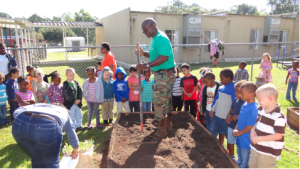
Jefferson County 4-H Agent, John Lilly, shows teachers how to prepare a raised bed garden.
Raised-bed Gardens– A raised bed garden is built from wood or plastic boards, typically four feet wide and as long as desired (four-feet-by-four feet for square foot gardening, up to 14 feet long rectangular beds). Because much of Florida soil is sandy and does not hold many nutrients, the deeper the garden beds, the better the soil will be. Many schools stack two boards on top of one another to achieve a 10 to 12-inch high garden bed, using 18-inch wooden stakes to keep the boards together. Potting mix, compost or garden sand from the site itself are added to fill the boxes, leaving two inches from the top as clearance. Raised beds help prevent kids from walking on delicate plant roots, clearly marks the boundaries of the bed and reduces some soil-borne pest problems. Clubs in urban areas have constructed raised beds directly on asphalt or concrete surfaces with successful results.
Benefits of Raised-Bed Gardening include:
- More control over the location of the garden
- Ability to choose the best soil for your particular plants
- More efficient draining
- Can be easier on backs and knees due to less bending and stooping
- Easier to keep out weeds
- The soil warms up earlier in a raised bed, so you can plant earlier and extend your growing season

The 4-H gardening project teaches valuable science and life skills.
In-Ground Gardens– Vegetables, fruit trees, and flowerbeds (such as butterfly gardens) can all grow directly in the ground, as farmers have for centuries. Gardens can be as small as four-feet-by-four-feet, or as large as the garden committee is willing to implement. Before planning a garden, dig several holes at the proposed site to collect soil samples for a pH test and to determine the soil type. Your local County Extension Office can test the soil. Most plants grow best with a pH of seven, but some have different pH requirements. Low-lying or seasonally moist areas will require different plants than high, dry, sunny areas with sandy soil.
Benefits of In-Ground Gardening Include:
- Use of existing soil. Most soils are perfectly fine for gardening, provided the soil is properly tilled, mulched and watered. Even without organic amendments, most soils can produce a bountiful harvest.
- Less start-up work (and cost). A flat, well-drained area can be quickly and easily prepared with a large rotor-tiller. You can also save on soil and bed or container materials.
- An in-ground garden can easily be replaced by another crop or moved to another location.
- Lower water requirements. In-ground beds won’t dry out as quickly as raised beds and will, therefore, require less water to maintain.
- Irrigation systems for flat, in-ground gardens are simple to design and easy to install compared to raise beds that require careful design and installation.
If you have a green thumb, consider going “totally green” as a 4-H gardening volunteer! 4-H needs caring adults like you to share their knowledge and passion for gardening with the next generation. Through the 4-H gardening project, youth not only learn gardening knowledge and skills, they also learn responsibility, teamwork, and other life skills that will help them grow up to be compassionate and competent citizens. To get involved, contact your local UF IFAS Extension Office, or visit http://florida4h.org./volunteers.
Your opinion matters! Please provide feedback on this short survey to help us improve our blog: https://ufl.qualtrics.com/SE/?SID=SV_3gtLKjqia3F75QN.












